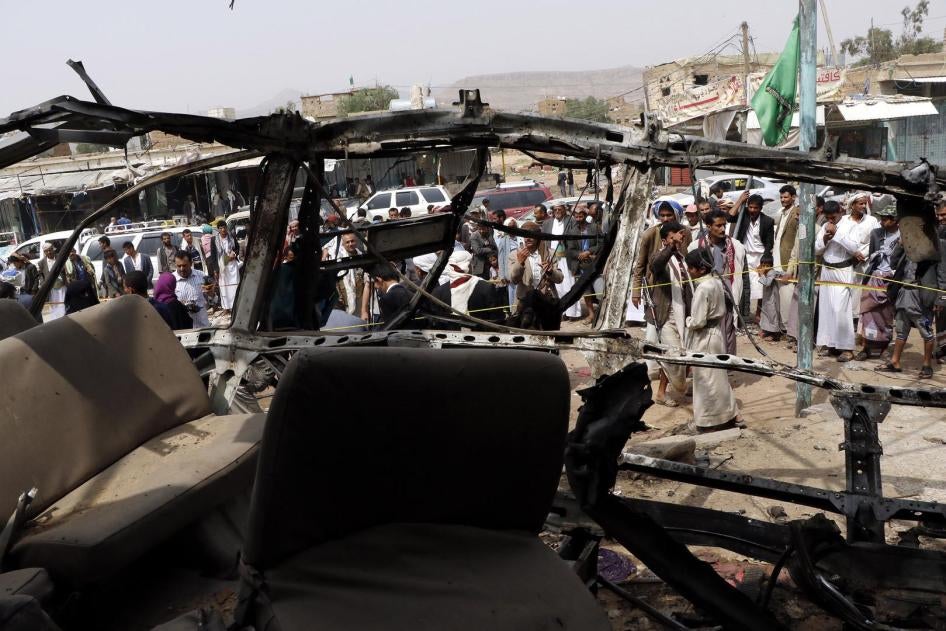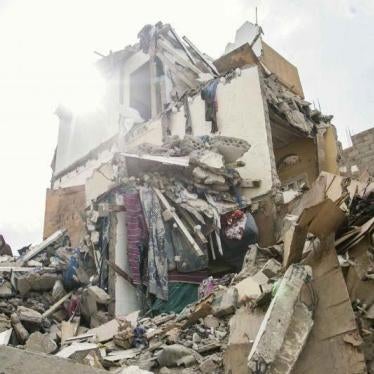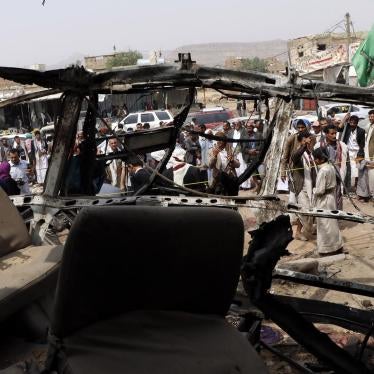On the fourth anniversary of the war in Yemen, Germany has come under pressure from the French and British governments to resume its arms sales to Saudi Arabia. But Germany's arms embargo is the right decision, and the countries still selling weapons to Saudi Arabia should follow suit.
For EU member states, a decision about arms sales to Saudi Arabia should be about complying with an EU Common Position adopted in 2008, which states that there should be no arms exports if there is a "clear risk" that such weapons will be used to commit "serious violations of international humanitarian law."
Human Rights Watch has documented dozens of Saudi and Emirati-led coalition attacks in Yemen in violation of the laws of war, many of which amount to war crimes. Scores of indiscriminate and disproportionate airstrikes have killed and wounded thousands of civilians, including many children, and hit civilian areas, including markets, homes, schools and hospitals.
The armed conflict has taken a terrible toll on Yemen’s civilian population and serious laws-of-war violations by the parties to the conflict have exacerbated what the United Nations has called the world’s largest humanitarian catastrophe. Millions of Yemenis face starvation, millions are displaced.
The coalition has repeatedly pledged to minimize civilian harm in future military operations. But instead it has failed to demonstrate any changes that have improved their targeting choices or ability to assess civilian harm. The coalition failed not only to put an end to its violations, but also to credibly investigate alleged war crimes. Its so-called investigative unit is nothing but a whitewash covering up atrocities.
In November, the European Parliament adopted a resolution calling on member states to suspend all arms sales to Saudi Arabia. Austria, Denmark, Finland, and Norway (as a member of the European Economic Area) reportedly have halted arms sales. But not the UK or France, for which Saudi Arabia remains a major arms buyer.
Last October, French President Emmanuel Macron implicitly lashed out after Chancellor Angela Merkel’s call for an arms embargo on Saudi Arabia, saying it was “pure demagoguery” to say "we must stop selling weapons.” The UK foreign minister has also criticized Germany’s decision, while choosing to ignore the recent findings of a UK parliamentary committee that the UK is on the wrong side of its own export license rules when it comes to its arms sales to Saudi Arabia.
Although it is a prominent point in the coalition treaty between the ruling parties CDU/CSU and SPD, the arms sales ban only came to full effect – halting all sales to Saudi Arabia in progress, without exception – after the murder of the journalist Jamal Khashoggi in a Saudi mission in Turkey in October 2018.
There is no doubt that Germany’s ban has a knock-on effect on European defense projects like the Eurofighter aircraft.
But by continuing their arms sales to Saudi Arabia, despite the Saudi atrocities being committed in Yemen, France and the United Kingdom risk becoming complicit in serious violations sending a message that narrow economic interests outweigh the lives of Yemeni civilians.
As France and Germany were about to hold a joint presidency at the UN Security Council, the French foreign minister, Jean-Yves Le Drian, pledged, with his German counterpart, Heiko Maas, to work together to protect multilateralism, "human rights and international humanitarian law, which are violated on a daily basis throughout the world.” Continuing to sell arms to Saudi Arabia in face of grave breaches of the law by the coalition, and pressuring Germany to reverse its decision to suspend arms sales, is blatantly inconsistent with this commitment.
“We have, because of our history, very good reasons to have very strict arms export guidelines,” Merkel said recently. Germany should stick to its principles and not compromise for the sake of profits and discord in its defense community. The lives and livelihoods of millions of civilians are at stake in Yemen. They should not be sacrificed on the altar of weakened joint European arms export control guidelines. Instead of pressing Germany to resume its arms sales to Saudi Arabia, France should live up to its promises and follow Germany’s example in ending Saudi arms sales.










